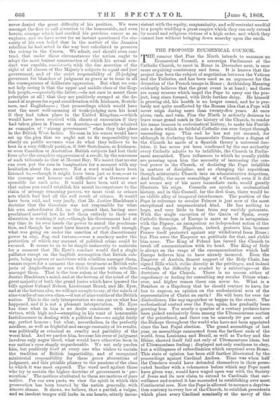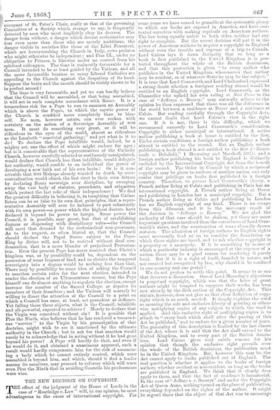THE PROPOSED MUM - FINICAL COUNCIL. T HE rumour that Pius the Ninth
intends to summon an Ecumenical Council, a sovereign Parliament of the- Catholic Church, to meet in Rome in December next, is once- more acquiring consistency and form. It is known that the- project has been the subject of negotiation between the Vatican and the Tuileries, and has been used as an argument for the- detention of the French troops in Rome ; Archbishop Manning evidently believes that the great event is at hand ; and there are many reasons which impel the Pope to carry out the pro- ject, long since formed, with little further delay. He himself- is growing old, his health is no longer sound, and he is pro- bably not quite unaffected by the Roman idea that a Pope wilt never reign during more than twenty-five years. At once- pious, rash, and vain, Pius the Ninth is ardently desirous to- leave some grand mark in the history of the Church, to render his name famous in ecclesiastical history, to make his Pontifi- cate a date which no faithful Catholic can ever forget through succeeding ages. This end he has not yet secured, for although in declaring the Immaculate Conception a dogma of the Church he made of a Spanish theory a universal doc- trine, it has never yet been confirmed by the one authority every Catholic admits to be infallible, the Church in Parlia- ment assembled. Then influences to which he usually yields- are pressing upon him the necessity of increasing the cen- tral power in the Church, of declaring the Pope infallible- in matters of discipline, and so changing the republican though aristocratic Church into an administrative despotism- And finally, the mere assemblage of a Council, even if it did! not secure any of his more immediate ends, would greatly illustrate his reign. Councils are epochs in ecclesiastical history, and in this Council, for the first time, there would be no visible alloy of temporal interference. The position of the- Pope in reference to secular Princes is just now of the most- exceptional and unprecedented kind. He has nothing to hope, and very little to fear, from any earthly potentate. With the single exception of the Queen of Spain, every Catholic Sovereign of Europe is more or less in antagonism_ with the Papacy, an antagonism no independent action of the- Pope can deepen. Napoleon, indeed, protects him because- France itself protested against any withdrawal from Rome ; but Pius owes the Emperor no gratitude for that, and yields- him none. The King of Poland has forced the Church to break off communication with its head. The King of Italy is always on the verge of the excommunication which half Europe believes him to have already incurred. Even the- Emperor of Austria, firmest support of the Holy Chair, has signed Bills which strike directly at the privileges, and indeed —though the difficulty is evaded by a subterfuge—at the- doctrines of the Church. There is no reason either of" expediency or feeling for consulting any secular Prince what- ever, and higher reason there can never be. What is a Bourbon or a Hapsburg that he should venture to have, far- less to express, an opinion on the ecclesiastical acts of the representative of Christ on earth ? He will burn for ever for- disobedience, like any rag-picker or beggar in the street. The ecclesiastical control over the Pope, again, has gradually been growing less. For nearly a quarter of a century prelates have- been picked exclusively from among the Ultramontane section of the priesthood, and there can be scarcely 20 per cent. of- the Bishops throughout the world who have not been appointed since the last Papal election. The grand assemblage of last year, an assemblage summoned from the farthest ends of the- world, from Louisiana and Brazil, as well as Turkey and the- Rhine, showed itself full not only of Ultramontane ideas, but. of Ultramontane feeling ; displayed not only readiness to obey,. but a willingness of subordination which surprised even Rome. This state of opinion has been still further illustrated by the- proceedings against Cardinal Andrea. Time was when half" . the Conclave would have defended themselves in their perse- cuted brother with a vehemence before which any Pope must. have given way, would have waged open war with the Society of Jesus and its new claim to extend to Cardinals that sur- veillance and control it has succeeded in establishing over most. Continental sees. Now the Pope is allowed to menace a depriva- tion contrary to every law of the Church, to establish precedents which place every Cardinal nominally at the mercy of the;
- Committee of a Society which, strange to say, is frequently detested by men who most implicitly obey its decrees. The danger from without, a danger which devout ecclesiastics may fear even more than those who are merely ambitious, the danger visible in societies like those of the Libri Pensatori, which are honeycombing the Church in Italy, cows prelates who might otherwise be independent ; and Pius IX., under no obligation to Princes, is likewise under no control from his spiritual colleagues. The time is eminently favourable for a Council intended to be at least guided by the Vatican, and all the more favourable because so many Liberal Catholics are appealing to the Church against the despotism of its head. Suppose the brain and the mouth should be visibly shown to be in perfect accord ? The time is very favourable, and yet we can hardly believe that the Council will be assembled, or that being assembled, it will act in such complete accordance with Rome. It is a tremendous risk for a Pope to run to summon an Assembly which is above the Popes, to which the mystic power of the Church is confided more completely than to him- self. No man, however astute, can ever reckon with certainty on the action of a Sovereign Assembly of 800 men. It must do something very great, or it will be ridiculous in the eyes of the world, almost as ridiculous as the Lambeth "convivial gathering ;" and yet what is it to do ? To declare the Pope infallible would, indeed, be a mighty act, one the effect of which might endure for ages ; but is it conceivable that the representatives of the Catholic Church, however carefully selected or assiduously manipulated, would declare that Church less than infallible, would delegate her authority, would confide to an individual the power of developing a new faith out of his own brain ? Or is it con- ceivable that 800 Bishops already worried to death by over- centralization would clinch the last rivet in their own fetters by declaring Rome sovereign over discipline, by sweeping away the vast body of statutes, precedents, and etiquettes which protect the last relic of their independence ? We find the greatest difficulty in believing it, in imagining that Catho- licism can be so false to its own first principles, that a repre- sentative Assembly will ever be induced to part voluntarily with its own power—a power which the highest doctors have declared it beyond its power to forego. Some power the Council, it is possible, may grant, but that of establishing dogmas or dispensing with disciplinary rules—the Council will meet that demand by the ecclesiastical non-possumus. As to the request, so often hinted at, that the Council should declare the Papal States subject to the Pope- King by divine will, not to be resisted without final con- demnation, that is a mere blunder of prejudiced Protestan- ism. Even the present Pope has never asserted that Christ's kingdom was, or by possibility could be, dependent on the possession of some leagues of land, and to elevate the temporal sovereignty into a dogma would be nothing less than that. There may by possibility be some idea of asking the Council to sanction certain rules for the next election intended to render the election of an Ultramontane secure, but the Pope himself can do almost anything to regulate the election, except increase the number of the Sacred College, or deprive its members of their franchise ; and the Vatican will scarcely be willing to direct the attention of the Council to a point on which a Council has once, at least, set precedent at defiance. Yet failing these three objects, what is the Council, infallible and all-powerful, expected to achieve ? Merely to declare that the Virgin was conceived without sin ? It is possible that Pius the Ninth, who believes that he has rendered a tremend- ous "service " to the Virgin by his promulgation of that doctrine, might wish to see it sanctioned by the ultimate authority in the Church ; but to ask for that sanction would surely be to acknowledge that in acting without it he had gone beyond his power? A Pope will hardly do that, and even if he would do it, and obtained a unanimous approval, such a result would hardly compensate him for the risk of summon- ing a body which he cannot entirely control, which once assembled is beyond him, and which, should it find a leader among its members, may proceed to reforms which will warn even Pius the Ninth that in avoiding Councils his predecessors were wise.



































 Previous page
Previous page